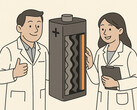Decommissioned batteries from older Tesla cars are now being used to power autonomous transport robots in the field.
Daedong Robotics, which makes automated lawnmowers similar to the popular Segway Navimow in the US, now offers the RT100, a compact transportation robot for agricultural work. It is powered by old battery cells taken from Tesla cars, serving not only as a recycling blueprint, but also as an example of how EV batteries can be reused.
The RT100's replaceable battery modules are provided by EV battery upcycling company Poen, which takes decommissioned Tesla packs and tests the individual cylindrical LG cells. It then takes apart those with sufficient residual capacity to repair and reassemble them into new battery packs, making an affordable power source for Daedong's agricultural transport robots.
The RT100 drives after the farmer, raises or lowers its loading bed to help them fill it with picked fruit, then goes to unload the crop and returns to the farmer. It is equipped with a 4x4 drivetrain for uneven terrain and can turn on a dime in tight orchard paths.
The maximum load that the RT100 can carry is about 300 kg or 662 pounds, and it can travel at a speed of five miles per hour. Needless to say, it can't go without some AI large language model shenanigans that allow taking voice commands from its operator via the dedicated Daedong app, too.
According to battery recycling juggernaut Redwood Materials whose CEO is Tesla's co-founder JB Straubel, over 95% of valuable materials like lithium, nickel, or cobalt, can now be extracted after the life cycle of an EV battery pack.
Just like the field robot of Daedong and Poen, Redwood also undertakes EV battery upcycling projects, such as a local grid with an energy storage system crafted out of old EV battery cells, proving the viability of such efforts.




















